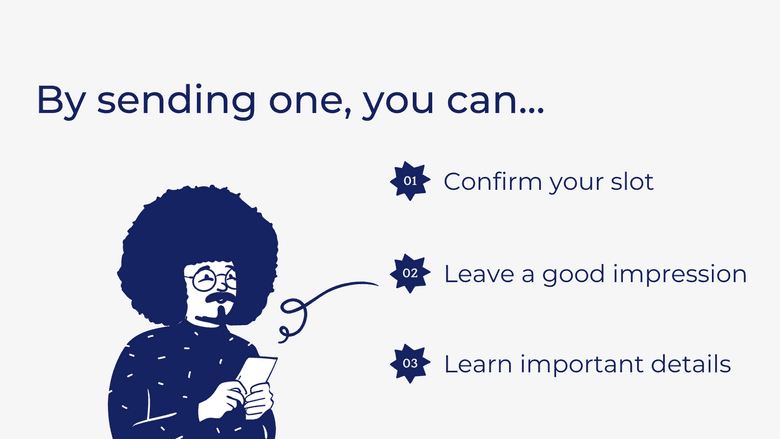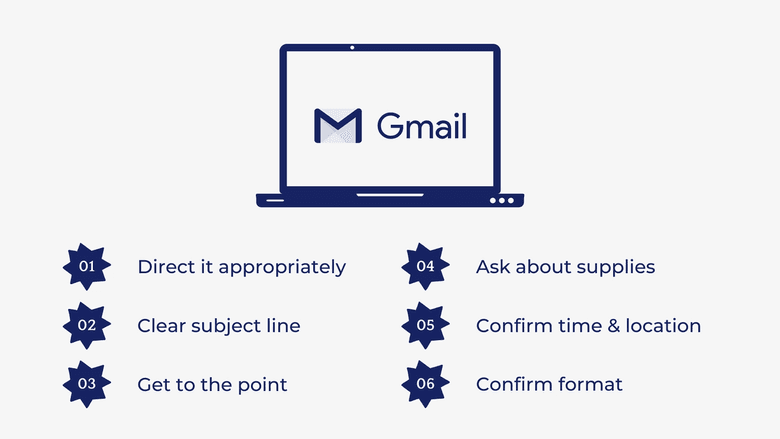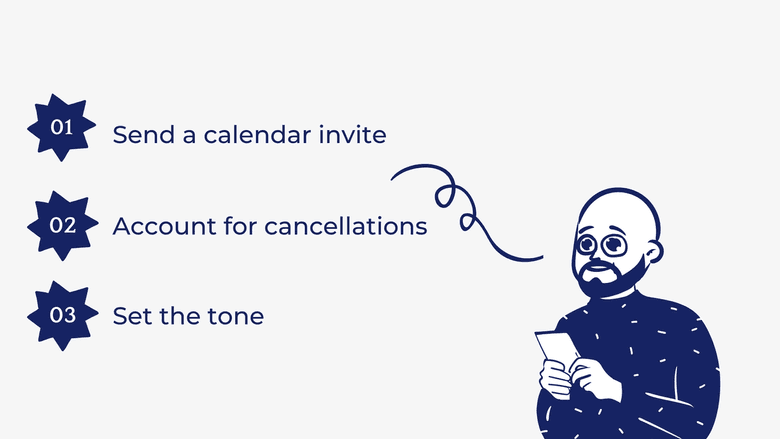
Yes, you definitely want to write an email back to the recruiter.

Charley Mendoza • June 5, 2020
Congratulations, you scored a job interview! After weeks of sending resumes and asking for job referrals, you’re now one step closer to a job offer.
You’re on a roll and you want to keep this going. Question is what should you do next now that you have an interview request? Do what a lot of applicants forget: send an interview acceptance email. You might think there’s no need to send a confirmation since they already invited you via phone call or email. But it’s still a good idea to give the recruiter and hiring manager a written confirmation of your attendance for three reasons.

Sending an interview confirmation email allows you to confirm critical details the recruiter might’ve forgotten to tell you, such as:
Pro Tip: Do you want to know if a recruiter replies quickly? What about if they are open and helpful enough to answer all your questions above? Check out Candor’s list of recruiters and how fellow applicants rate them.

Send an interview confirmation email as soon as you receive notice of the invite. The only reason not to send one right away is if the recruiter mentioned they will send it to you. If that’s the case, just wait for their message and send your confirmation from there.
Don’t wait until the last minute to send an interview confirmation email reply, even if your interview isn’t for another two or three weeks. Remember, they might give your slot to someone else if they sense you’re not keen on it.

Choose “Reply All” if other people within the organization were CC’d on your interview invitation, as they might be part of the hiring committee or part of the human resources team coordinating the job search. Just make sure the “To” field is for the person who invited you to the interview.
Pro Tip: Research the names and emails on CC’d on the invite. You might encounter them in your interview, so it’s nice to prepare a few ice breakers in advance. Better yet, use this research to gauge what kind of interview questions they might ask you.
Recruiters and hiring managers will line up several candidates for the job you’re interviewing for, and a few more people for other positions. Help keep their inbox organized by including your name and desired job on your email subject line.
Tell them why you’re writing upfront and be tactical - give them the best contact information or phone number for you. Don’t gush on about how you love the company: save that for the interview.
The interviewer might ask to see your portfolio or your GitHub profile. Ask if you can bring a laptop or tablet to showcase your work. If you're doing this over video - make sure you ask if screen-sharing is okay.
Be careful not to bring anything that might compromise your current employer’s intellectual property and confidential information.
Bring extra copies of your resumé to the interview, too, if you're doing it in person.
Confirm the exact time and location of the interview, including the estimated duration of the whole process. If you’re still employed and the interview falls on a weekday, you’ll need to know how long the interview will be, so you can file a leave.
If the recruiter asked you to choose a date and time, pick two date and time combinations that work but indicate your preferred schedule.
Keep in mind when choosing a schedule:
Sometimes, recruiters will only tell you one part of the interview process either because they’re not sure you’ll make it to the next round or because things might change based on the team’s availability.
Whatever the case, it’s in your best interest to confirm who you will meet, how long each meeting will take, and the format of each discussion. You don’t want to be caught off guard during a panel interview with an investor, the CEO, and the CTO of your dream startup company, right?

Send a placeholder calendar invite once the recruiter replies with a confirmation of all the interview details.
Now you might ask, “Why do I have to send an invite when I already sent an interview acceptance email?”
The people interviewing you will be incredibly busy, especially if you’ll be talking to non-HR personnel like the CTO, CEO, lead developer, or project manager. Think of this as another way to ensure your interview is penciled-in to their calendar.
Send an email to everyone interviewing you a day before the event. Do this if your interview was scheduled at least one week ahead.
It doesn’t have to be complicated, just write:
Jane Smith Interview, Product Manager Role
Hey (Name),
Just checking in to confirm if you’re still available for our 10AM interview for the (Position) tomorrow.”
If their availability changes, at least you didn’t waste precious time traveling to a postponed interview.
Your resume might’ve opened the doors and got them curious about what you bring to the table. But how you communicate with them from here on sets the tone of your job application. It starts with your interview acceptance email.
A couple of things to note about the template below:
Interview Confirmation for (Job Title) – (Your Name)
Hi (Inviter’s Name),
Great to hear back from you. Thanks for the opportunity. I’m excited to meet you on Wednesday, May 21 3PM at Unit 36F XYZ Offices Main St.
This talk will help me learn more about the role and your company’s culture, and time permitting, share some of my ideas with you.
I have a few questions though about this meeting:
· How much time do you estimate this whole process will take? I ask so I can prepare to take a leave at work if needed
· Can I bring a laptop? If not, will I have access to a computer to show you my work?
· Who else will interview me aside from you? What will be the format of this discussion?
· Aside from my resume, is there something else I should bring with me?
I hope you can help me clarify these points.
Looking forward to meeting you!
Regards,
(Your Name)
(Contact Number)”
The information provided herein is for general informational purposes only and is not intended to provide tax, legal, or investment advice and should not be construed as an offer to sell, a solicitation of an offer to buy, or a recommendation of any security by Candor, its employees and affiliates, or any third-party. Any expressions of opinion or assumptions are for illustrative purposes only and are subject to change without notice. Past performance is not a guarantee of future results and the opinions presented herein should not be viewed as an indicator of future performance. Investing in securities involves risk. Loss of principal is possible.
Third-party data has been obtained from sources we believe to be reliable; however, its accuracy, completeness, or reliability cannot be guaranteed. Candor does not receive compensation to promote or discuss any particular Company; however, Candor, its employees and affiliates, and/or its clients may hold positions in securities of the Companies discussed.